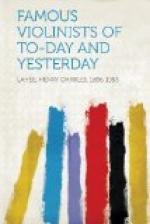“What else can you do?” he once asked of a young man who desired to become a great violinist, and had sought Joachim’s advice.
“I think I would like to study for the ministry,” was the reply.
“It is much better to be a good minister than a poor violinist,” said Joachim, looking him full in the face.
His liberality is proverbial, and after a long and successful life, during which he has received high salaries, he is not rich. He seldom refuses to play gratis for any really worthy object, and the anecdotes of his kindness toward his pupils are without number.
Few men have shone with such an even, steady lustre, through a long life. Others have come up, flourished, and sunk into oblivion, but the light of Joachim has shone steadily for more than sixty years, and as an interpreter of the classics he has never been excelled, and perhaps never will be.
CHAPTER IX.
VIOLINISTS OF TO-DAY.
In these latter days the number of good violinists seems to have increased greatly. A season seldom passes without witnessing the debut of some half-dozen aspirants for public approbation, but the great majority of them settle down into some special field of labour, and do not acquire world-wide fame as virtuosi.
Virtuosity to-day depends very largely on the art of advertising. In the old days of Viotti and Spohr, the violinist would remain in a city for months, make acquaintances, and gradually acquire a reputation which would justify his giving some concerts. A tour lasting from three to six years would cover a comparatively small amount of territory.
To-day the concert agent searches among the new lights for one or two who seem, in his judgment, likely to please the audiences to whom he caters, and who will justify the curiosity roused by the wholesale advertising done in their behalf.
The violinist is rushed from one place to another with mechanical precision, and flits from Maine to California and from Canada to the Gulf in a few short weeks. There are more soloists, more concerts, more musical organisations than ever before.
It does not follow by any means that the travelling virtuoso is one of the greatest violinists of his time. There are, in every city of Europe and in many cities of America, violinists who equal or even excel many of those who are exploited as virtuosi. The great violinists are not to be found every day. In the past twenty years, perhaps, not more than two can be recalled who have visited the United States as mature, great artists,—Wilhelmj and Ysaye. Many violinists of excellent ability have been heard, and to some of them some day the adjective great may be applied. The fact that they have devoted their energies to concert work, and have been favourably received by the most important musical organisations, makes them celebrated, but the word great can apply but to few.




